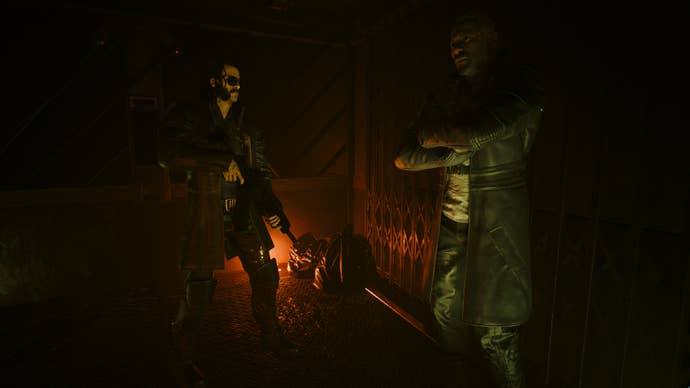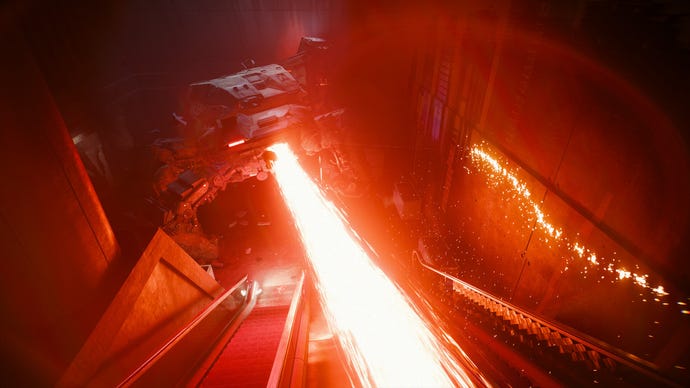Cyberpunk 2077 Phantom Liberty sound designers talk creating the unforgettable Chimera chase
Ever wondered what went into giving Dogtown’s robotic beast its mechanical growls?
“I designed the (the) Chimera to be inorganic, but human enough to be frightening,” Masanobu ‘Tomi’ Tomita, senior supervising sound designer at Sound Lab, a Keywords Studio, tells me. “I wanted people to be in awe of this beast and feel its power when playing the game.”
Tomita and fellow Sound Lab sound designer Gabriel Acosta produced the soundscapes for a number of elements of Cyberpunk 2077’s Phantom Liberty expansion, providing support for the work being done by CD Projekt Red’s internal sound team - made up of Lead Sound Designer Krzystof Popiel and Audio Producer Joanna Frankowska. “Every project I work on has its own unique style and requirements and Cyberpunk 2077 was no different,” Tomita says. “For Phantom Liberty, the sounds needed to have a futuristic - yet believable - flavour.”
“I aimed for intricate and innovative details in the design that still grounded the player in reality, while at the same time imagining what the reality of the future sounds like,” adds the 17 year veteran with a substantial list of sound design credits to his name across game and film, including work in Devil May Cry 5, Destiny 2, and several of Final Fantasy 16’s eikons.
“It was great to have the opportunity to work on Phantom Liberty because it required nailing a very specific aesthetic, blending realism and futuristic sci-fi into a believable but fun sound palette," explains Acosta, who’s previously worked on Valorant in addition to a number of other titles. “It was a challenge for sure and we spent a lot of time just throwing stuff up against the wall to see what would stick.”
While neither of the designers got the chance to work on the base version of Cyberpunk, Acosta does recall having “a ton of fun playing through it on the initial release”, adding: “I really enjoyed all the vehicle options and just exploring the massive world CDPR built.”
Among the aspects the pair brought to life audio-wise for Phantom Liberty was the iconic Chimera tank chase sequence and boss fight from the expansion’s third main mission, ‘Spider and the Fly’. When I first delved into Dogtown back in September, battling the tank-like and frenzied Militech combat robot alongside President Myers was one of the first moments of the expansion that really made a big impression on me, and that was certainly no accident.
“Hopefully it’s a tense, adrenaline-fueled experience, like [you’ll] end up in the Chimera’s maw if you didn’t escape fast enough,” Acosta says when I ask him what kind of effect he hoped the “big, bombastic action sequence” would have on players. In order to capture the perfect blend of man and automaton in the bot, Tomita drew inspiration from “machines like the Terminator T-1000, which aims for relentless attacks”.
From a practical perspective, Tomita relished the challenge that the Chimera presented, explaining: "[It] had a lot of moving parts and intricate elements that required extreme attention to detail. I spent a lot of time dialling in the sound through trial and error to get the balance of the elements just right.” For Acosta, the lasting memory of working on the sequence is “crafting all the destruction”, with the designer recalling: “I got to layer up all sorts of metal, glass and concrete explosions and just go to town. That was fun!”

Another aspect of the expansion the pair played a part in were the soundscapes attached to some of the new weapons it brought to the game. Tomita worked on the unique NDI Osprey sniper rifle found in FIA Agent Alex Xenakis’s safehouse, while Acosta did the equally rare Erebus SMG.
The former involved the creation of a “powerful and special alloy feel”, with Tomita explaining: “My approach is to first work on core sound, which is the punchy part of the gun. Then I focus on the specific flavour of [the] weapon.” In addition to creating sound elements to cover everything from “the mechanism of the firing motion”, to indicating when the gun’s starting to run low on ammunition and even the clicks you’ll hear if you pull the trigger once you’ve run totally dry, he also designed the different sounds it’ll make in different environments.
For example, the gun won’t sound exactly the same if you fire it indoors, then do the same after heading out into a busy street - open outdoors areas and tunnels also have their own special variants. Acosta, meanwhile, says that putting together the Erebus’ metallic harmonies, he “had to balance a powerful, satisfying feeling when you’re firing or interacting with it, while allowing the futuristic design to shine through.”
At the end of the day, in my estimation, it’s that idea of brutal, human realism amid neon-soaked, mechanical future that really makes Phantom Liberty’s most memorable moments feel like they do, and they certainly wouldn’t be anywhere near as great without the hard work that’s clearly gone into designing the audio that accompanies them.

